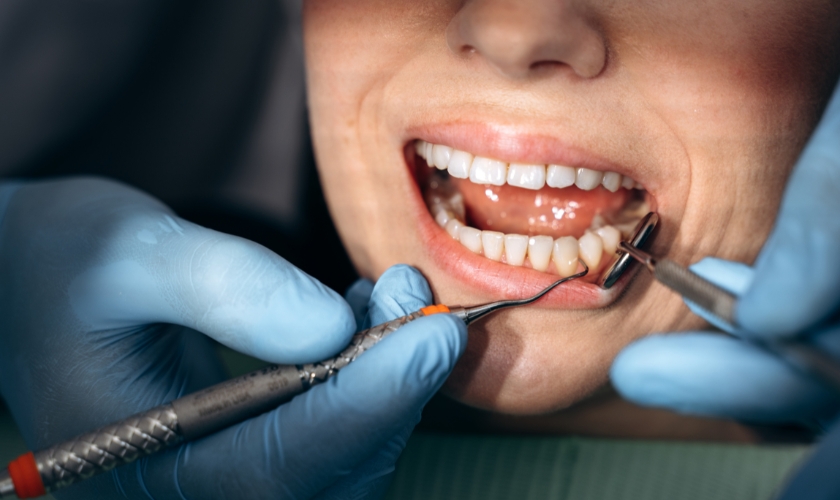The Unexpected Oral Health Signs That Could Indicate Systemic Diseases

Your oral health does more than just affect your smile—it can give you valuable clues about your overall health. Many people overlook the signs their mouth can reveal, but oral symptoms might actually point to systemic diseases like diabetes, heart disease, or even autoimmune disorders.
That’s why it’s important to listen to your body and pay attention to any unusual changes in your oral health.
By recognizing and addressing these signs early, you can take proactive steps to improve both your oral and overall health.
In this blog, we’ll explore some unexpected oral health symptoms that could signal underlying systemic conditions. Read on to learn what these signs are and how you can take action to stay healthy!
How Oral Health Reflects Systemic Diseases?
Your mouth offers more insights into your overall health than you might think. The mouth-body connection reveals that issues in your oral health can sometimes reflect or even signal systemic problems. Dentists frequently identify these connections during routine exams.
- Inflammation in the mouth, such as gum disease, can link to chronic conditions like diabetes or heart disease.
- Persistent oral issues can indicate a broader systemic problem, making it crucial to monitor changes in your oral health.
- Regular dental checkups allow professionals to detect potential health problems early, offering a chance to address them before they escalate.
Understanding these links emphasizes why maintaining dental hygiene and visiting your dentist regularly isn’t just about keeping your teeth healthy—it’s about protecting your entire body.
Common Oral Health Signs of Systemic Diseases
Certain oral symptoms may point to underlying systemic diseases. These signs often go unnoticed but shouldn’t be ignored.
- Bleeding gums: This can signal diabetes or cardiovascular disease due to increased inflammation and poor wound healing.
- Persistent bad breath: Chronic bad breath may suggest GERD, liver problems, or sinus infections.
- Mouth ulcers: Recurring sores could indicate autoimmune disorders or deficiencies in iron or vitamins like B12.
- Loose teeth: Weak teeth can be linked to osteoporosis or advanced gum disease, which weakens the bone supporting your teeth.
- Dry mouth: Reduced saliva production may stem from diabetes, Sjögren’s syndrome, or side effects of medication.
By paying attention to these symptoms and seeking professional help, you can take steps to address potential health problems. If you’re experiencing persistent symptoms, schedule an appointment with a general dentist in Loomis, CA, who can evaluate and guide you appropriately.
The Role of Dentists in Early Detection
Dentists play a vital role in identifying oral signs that may indicate systemic diseases. Their unique expertise allows them to spot issues during regular exams that might otherwise go unnoticed.
- Dentists can detect unusual symptoms like gum inflammation, loose teeth, or chronic bad breath that signal broader health problems.
- Sharing your medical history with your dentist can help them identify patterns that connect oral and overall health.
- Dentists often collaborate with physicians, offering a holistic approach to your care and ensuring that potential issues are addressed comprehensively.
Routine dental visits aren’t just about treating cavities—they’re about protecting your long-term health. Dentists can guide you toward improving your dental hygiene and identifying problems that might extend beyond your mouth.
Steps to Maintain Oral and Systemic Health
Taking care of your oral health protects more than just your teeth. It’s a vital step toward preventing systemic complications.
- Brush and floss daily to keep your gums healthy and reduce the risk of inflammation.
- Limit sugary foods and include nutrient-rich options in your diet to support both oral and systemic health.
- Stay hydrated to prevent dry mouth and encourage saliva production, which protects your teeth.
- Schedule regular dental checkups to catch potential issues early and stay ahead of oral problems.
Maintaining good dental hygiene improves your oral health and reduces the risk of systemic diseases. By taking a proactive approach to both dental and general health, you create a foundation for a healthier life.
When to Seek Medical Advice?
Some oral symptoms may indicate serious health concerns that require immediate medical attention. Knowing when to seek help can make all the difference.
- Persistent oral sores or ulcers lasting more than two weeks may point to autoimmune disorders or even oral cancer.
- Excessive bleeding gums, despite good oral care, could signal diabetes or a blood disorder.
- Chronic dry mouth, tooth loss, or severe gum recession warrants a comprehensive checkup.
If you notice these symptoms, consult both your dentist and physician. They can work together to provide comprehensive care. Early intervention is key to addressing potential health issues effectively, ensuring your oral and overall health remain on track.
Your oral health is more than just a reflection of your hygiene—it’s a window into your overall well-being. Paying attention to unusual symptoms and maintaining regular dental visits can help detect and prevent systemic health issues. Prioritize your health by partnering with your dentist and physician for proactive care. A healthy smile leads to a healthier you.




